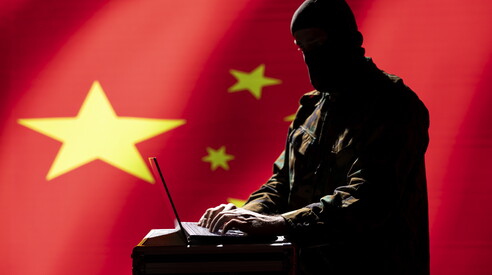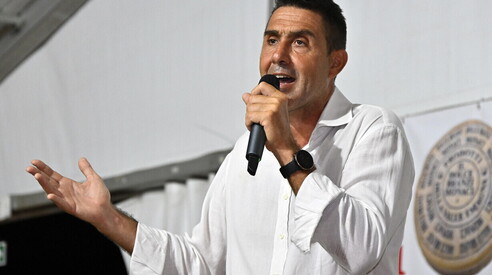
A Digital Whisper: How a Fake Law Student Tried to Shape the Narrative Around the Xu Case
It all begins with the story of a Chinese national arrested in Milan, awaiting extradition to the United States. Behind a seemingly harmless email written in clumsy Italian, a glimpse into how foreign actors test small-scale influence operations — subtle, deniable, and aimed at shaping public debate in Italy
This article is an excerpt from Katane, Il Foglio’s weekly newsletter by Giulia Pompili, covering news and stories from the Indo-Pacific. It’s in Italian — and it’s free. You can subscribe here.
You may remember Xu Zewei, the 33-year-old Chinese IT specialist arrested on July 3 at Milan’s Malpensa Airport under a warrant issued by U.S. authorities. The FBI accuses him of spying for China’s Ministry of State Security, alleging that he hacked U.S. systems to steal information about COVID-19 vaccines. For Italian judges, it’s a legally complex case — but above all, a political one, with Italy caught between Washington and Beijing over whether to extradite him.
On September 21, I received an email at my official Il Foglio work address. “Dear Ms. Giulia Pompili, I am a student at the Faculty of Law of the University of Rome.” The sender signed with an Italian name, but his Gmail address was an alphanumeric code — suspicious in itself. The “student” wrote in oddly formal, old-fashioned Italian, full of grammatical mistakes, yet claimed to have read my article on Xu and to want to “offer new perspectives and starting points for any follow-up reporting.”
What this supposed third-year law student wanted to stress was that Xu’s alleged offense is political, and that Italy’s Constitution forbids extradition for political crimes (Article 26). He also suggested that if I wanted “the most professional opinions,” I should interview Xu’s defense lawyer, Enrico Giarda.
During Xu’s extradition hearing on October 1, his legal team made a similar argument — that the case is political and therefore extradition is impossible.
Xu, for his part, insists his arrest is part of “a political strategy of persecution against the Chinese people by the United States.”
But why would a third-year law student at Sapienza University be so invested in this case? In our exchange, the supposed student said he had tried to submit the issue to academic journals “without success,” and was now “reaching out to public media. I’m sure it can attract attention and spark valuable reflection on this important topic.”
When I asked to meet in person, there was no reply. When I asked about his studies, again — silence. After September 28, he stopped responding altogether. His final message linked to an article in Corriere della Sera about the “political offense” clause, which Italy’s judiciary — and eventually Justice Minister Carlo Nordio — will have to address.
The same emails, from the same sender, also reached journalist Gabriele Carrer, who reported on them.
For anyone in this profession, messages like that are a red flag. Before clicking a link or replying, we run security checks through professional cybersecurity services. Nothing malicious was detected, but the emails were clearly written with the help of AI or machine translation, and almost certainly part of a small-scale influence attempt — a bid to manipulate public debate around the Xu case, which in Italy has already faded from view.
On October 9, Italy’s Court of Cassation rejected Xu’s request for house arrest. He remains in custody.
It’s a minor episode, but it captures something larger: how foreign actors test influence operations in subtle, sometimes clumsy ways — not to hack systems, but to hack the conversation. Small attempts at manipulation — an email here, a whisper there — often go unnoticed. But taken together, they sketch the contours of a much bigger picture.
Just a couple of days ago, the Italian Senate’s Foreign Affairs, Defense, and EU Affairs committees approved a resolution on “Foreign Interference in the Democratic Processes of EU Member States and Candidate Countries.” For months, lawmakers heard from experts and studied how foreign powers shape public opinion and infiltrate institutions — particularly Russia and China, two key players in today’s hybrid warfare.
Still, the final text was softer than many had hoped. It no longer calls for a coordinated government response. The reason? Politics.
The Five Star Movement (M5S) abstained, after unsuccessfully trying to invite Russia’s ambassador to Italy to “hear the other side.” The party argued that “foreign influence” should also include figures like Jeff Bezos and Elon Musk. Even Matteo Salvini’s League, which had repeatedly delayed the vote and demanded amendments, eventually voted in favor — but only after removing any reference to Russian propaganda in Italy. Senator Claudio Borghi (League) skipped the vote entirely.
Yet Enrico Borghi of Italia Viva struck a rare optimistic note: “With a cross-party vote, the Italian Parliament has acknowledged that there are foreign state and non-state actors, outside the EU, increasingly resorting to information manipulation and other means to interfere in democratic processes.”


tra stati uniti e italia
J. D. Vannacci: vite politiche parallele dei vice di Trump e Salvini




